Decades ago, managing complex legal cases was reserved for a small elite. Those who speak in Latin phrases, who know what discovery and depositions are. People into obscure procedural rules, who love to debate jurisdiction nuances over coffee.
Basic document sharing was the first opening of that exclusive club to modern legal teams. But now the gates are wide open: AI-powered legal collaboration tools are here to make you forget the administrative chaos even exists. If it streamlines your practice, who cares how complex the backend is?
So, which ones are worth your time, money, and sanity? I kept about 20 browser tabs open to test collaboration workflows across different practice areas to answer that question. Based on extensive testing with real legal teams, here are the legal collaboration platforms that’ll make you feel superpowered—understanding of ancient legal procedures not included.
The best legal collaboration tools
Clio for comprehensive practice management
Microsoft Teams for secure communication
NetDocuments for document management
Slack for instant team coordination
Notion for case organization
Asana for project management
Zoom for client meetings
DocuSign for electronic signatures
What makes the best legal collaboration tool?

Before this category matured, we had scattered solutions, email chains, physical file cabinets, and prayer. Most platforms were either too generic for legal work or too specialized to integrate with existing workflows, forcing lawyers to choose between security and usability.
We also had the first wave of cloud-based legal software, early attempts at digitizing law practice. You’d start with basic case management, and you’d see firms slowly adopting digital workflows. The interfaces were clunky, and you could only handle simple matters with minimal collaboration features.
There have been two major changes since then. Security standards exploded, with end-to-end encryption and compliance frameworks joining the scene. On top of that, thanks to AI integration, workflow automation has been improving massively, this is the software that gives legal teams the capacity to automate routine tasks and maintain comprehensive audit trails, adding more efficiency and support for complex multi-party cases.
Thanks to this, the best legal collaboration tool will take a case and transform it into an organized workflow, managing deadlines, documents, and communications. It also includes all the core tools for secure sharing, offering compliance with legal industry standards like attorney-client privilege protection.
Testing criteria
Beyond those general aspects, here are the criteria I used while testing:
End-to-end case management. These legal collaboration tools can get you from case intake to resolution without requiring multiple platforms or manual workarounds.
Security-first design, not afterthought. Client confidentiality and data protection are built into the core architecture, not added as premium features.
Bar compliance standards. Each tool meets or exceeds ethical requirements for legal practice, including proper audit trails and privilege protection.
Integration capabilities. Works seamlessly with existing legal software like billing systems, court filing platforms, and research databases.
Accessible to all team members. While legal expertise is required for substance, the collaboration features are intuitive enough that paralegals, assistants, and clients can participate effectively.
Over the past month, I tested these tools with personal injury cases, corporate transactions, and litigation matters, working with teams ranging from solo practitioners to mid-size firms.
What about legal-specific project management and document review platforms?
Some popular legal technologies didn’t make it into this list. They fall into categories that make them too specialized, focusing on narrow tasks rather than broader collaboration needs. They use highly technical legal language and focus on workflows that only senior attorneys follow for specific practice areas.
There are established category names in legal tech, so here’s how I broke them down:
Document review platforms, like Relativity and Logikcull, focus on e-discovery and litigation support. These platforms specialize in processing massive document sets for large cases, requiring extensive training and substantial budgets.
Court filing systems, such as PACER integrations and e-filing platforms, handle the technical requirements of submitting documents to courts. They’re essential but serve a specific function rather than broad collaboration.
Legal research tools, like Westlaw and LexisNexis, provide case law and statutory research capabilities. While crucial for legal work, they’re primarily research-focused rather than collaboration-centered.
All the tools on this list facilitate collaboration across different roles and practice areas. You’ll need to learn some legal technology best practices along the way, sure. But you won’t get overwhelmed with case law citations or procedural complexities that’ll block your team from working together effectively.
The best legal collaboration tools at a glance
| Tool | Best for | Standout features | Pricing |
|---|---|---|---|
| Clio | Comprehensive practice management | Built-in billing, client portal, matter management | Plans from $49/month per user |
| Microsoft Teams | Secure communication | Enterprise security, Office 365 integration | Plans from $6/month per user |
| NetDocuments | Document management | Legal-specific security, version control | Custom pricing |
| Slack | Instant team coordination | Channel organization, app integrations | Free plan; paid from $8.75/month per user |
| Notion | Case organization | Flexible databases, template sharing | Free plan; paid from $10/month per user |
| Asana | Project management | Task dependencies, timeline views | Free plan; paid from $13.49/month per user |
| Zoom | Client meetings | Recording capabilities, waiting rooms | Plans from $14.99/month per license |
| DocuSign | Electronic signatures | Legal compliance, audit trails | Plans from $15/month per user |
Best legal collaboration tool for comprehensive practice management
Clio
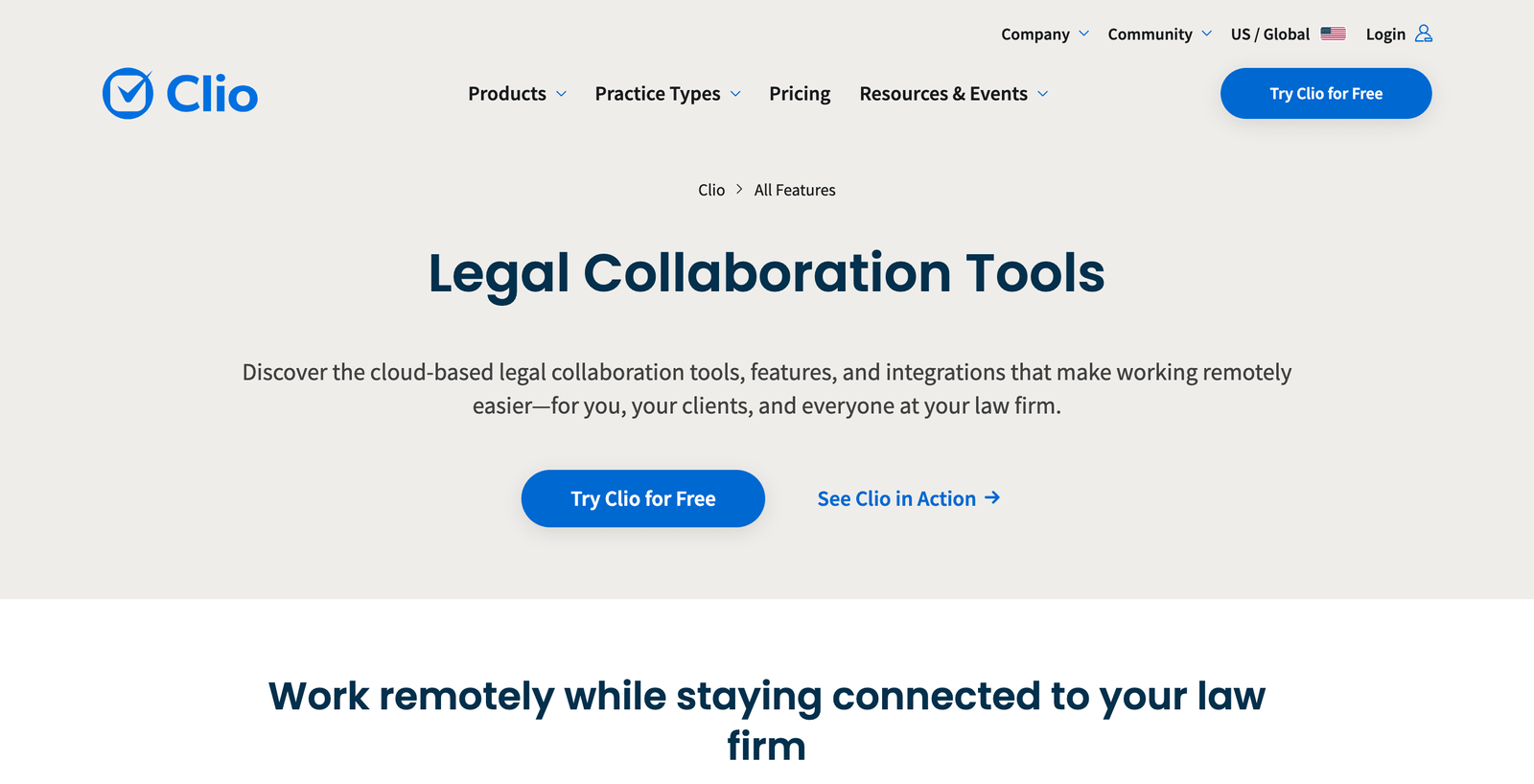
Clio, our pick for the best legal collaboration tool for comprehensive practice management
Clio pros:
- Integrates billing, time tracking, and case management in one platform
- Strong client portal for secure communication
- Extensive third-party integrations
Clio cons:
- Can be expensive for larger teams
- Learning curve for advanced features
Ready to manage your entire practice from one platform? Need seamless collaboration between attorneys, staff, and clients? Clio sits at the top of many legal tech lists not because it does one thing extremely well, but because it’s the most comprehensive solution for law firm collaboration.
The case management features work smoothly from intake through resolution, and the collaboration tools integrate naturally with legal workflows. After you create a matter, the platform organizes documents, communications, and tasks automatically. As you work on cases, it tracks time and generates bills, giving you complete visibility into profitability and productivity.
Even if your team has varying technical skills, it’s important to understand the difference between practice management (organizing cases, clients, and business operations) and document management (storing, sharing, and versioning files). Clio handles both sides effectively, with secure client portals for external collaboration and internal workspaces for team coordination.
Beyond core practice management, Clio integrates with QuickBooks for accounting, Office 365 for document creation, and Zoom for client meetings. This creates a seamless workflow where your collaboration tools talk to each other, reducing duplicate data entry and potential errors.
Clio price: Plans start at $59/month per user for Clio Manage, with higher tiers offering advanced features like document automation and business intelligence.
Best legal collaboration tool for secure communication
Microsoft Teams

Microsoft Teams, our pick for the best legal collaboration tool for secure communication
Teams pros:
- Enterprise-grade security and compliance features
- Deep integration with Office applications
- Familiar interface for most users
Teams cons:
- Can feel overwhelming with numerous features
- Requires proper setup for legal compliance
Microsoft Teams brings enterprise-level security to legal team communication. The platform includes advanced compliance features specifically designed for regulated industries, including legal holds, eDiscovery capabilities, and audit trails that meet court requirements.
The chat and channel structure works well for organizing case-related discussions. You can create private channels for sensitive matters, ensuring attorney-client privilege is maintained. The integration with SharePoint means documents shared in conversations are automatically stored with proper version control and access permissions.
What sets Teams apart for legal work is the compliance center. You can set retention policies for different types of communications, ensuring important case discussions are preserved while routine administrative chats don’t clutter your records. The platform also supports legal holds, automatically preserving communications when litigation is anticipated.
The calling and meeting features include recording capabilities with transcription, useful for client meetings and depositions (with proper consent, of course). The waiting room feature helps maintain confidentiality by controlling who can access sensitive discussions.
Microsoft Teams price: Included with Office 365 Business plans starting at $6/month per user, with advanced compliance features in higher-tier plans.
Best legal collaboration tool for document management
NetDocuments
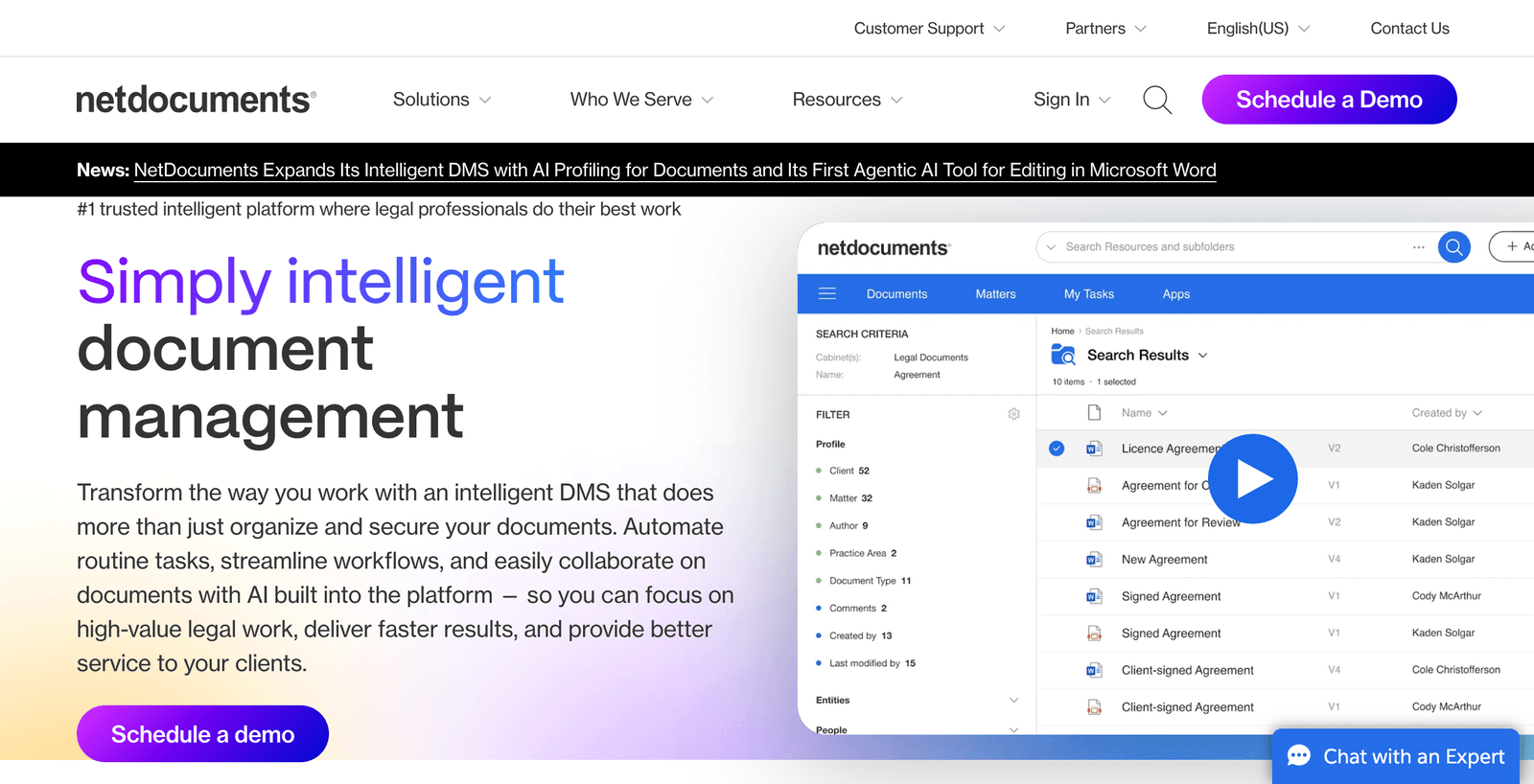
NetDocuments, our pick for the best legal collaboration tool for document management
NetDocuments pros:
- Built specifically for legal industry requirements
- Advanced security with granular permissions
- Excellent version control and collaboration features
NetDocuments cons:
- Higher cost than generic solutions
- Requires training for optimal use
NetDocuments was designed from the ground up for legal practices, and it shows. The platform understands legal document workflows, from brief collaboration to contract redlining, with features specifically tailored to how lawyers work with documents.
The collaboration features shine when multiple attorneys need to work on the same document. The platform tracks all changes, maintains comprehensive audit trails, and allows for simultaneous editing without version conflicts. Comments and suggestions are threaded properly, making it easy to follow the evolution of legal arguments or contract terms.
Security goes beyond basic access controls. NetDocuments includes ethical walls to prevent conflicts of interest, matter-based permissions that automatically restrict access based on case assignments, and integration with single sign-on systems for enterprise security policies.
The search functionality understands legal documents, allowing you to find precedents, clauses, or case references across your entire document repository. The platform also integrates with major legal research platforms like Westlaw and LexisNexis, creating a unified workspace for research and document creation.
NetDocuments price: Custom pricing based on firm size and feature requirements. Best legal collaboration tool for instant team coordination
Slack
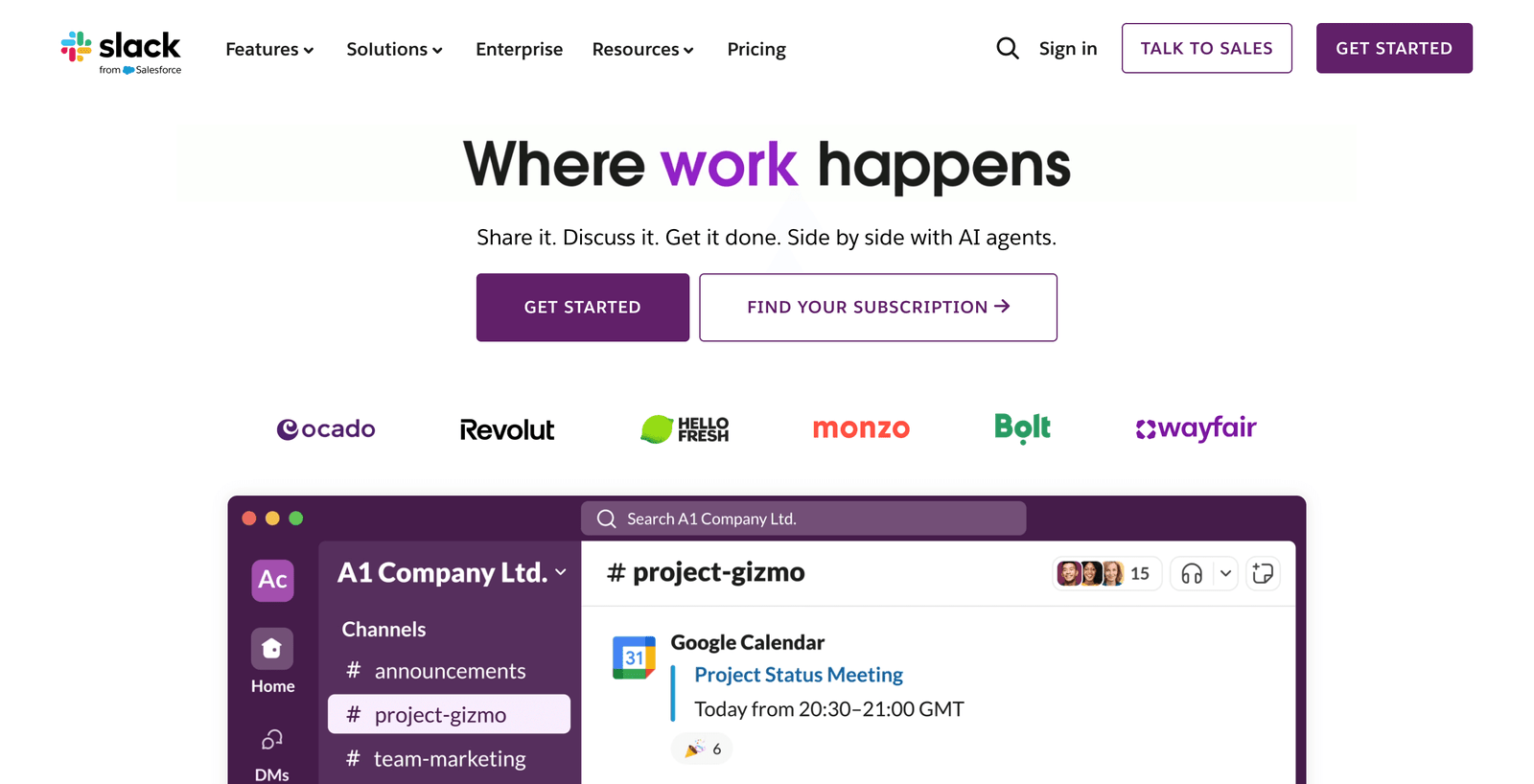
Slack, our pick for the best legal collaboration tool for instant team coordination
Slack pros:
- Intuitive channel-based organization
- Extensive integration ecosystem
- Strong search and archive capabilities
Slack cons:
- Requires careful setup for legal compliance
- Can become cluttered without proper channel management
Slack excels at keeping legal teams coordinated throughout the day. The channel structure works perfectly for organizing discussions by case, practice area, or administrative topics, while direct messages handle sensitive one-on-one communications.
The platform’s strength lies in its integration capabilities. You can connect Slack to Clio for case updates, DocuSign for signature notifications, and Google Calendar for court date reminders. These integrations mean important updates reach your team instantly without requiring them to check multiple systems.
For legal teams, the search functionality is crucial. Slack indexes all messages and files, making it easy to find past discussions about specific cases or clients. The threading feature keeps detailed discussions organized, while pinned messages can highlight important case information or deadlines.
Security features include enterprise key management, data loss prevention, and compliance exports for legal holds. The platform can integrate with legal-specific security tools and maintains audit logs that meet court requirements.
Slack price: Free plan available for small teams, with paid plans starting at $8.75/month per user for advanced features and compliance tools.
Best legal collaboration tool for case organization
Notion
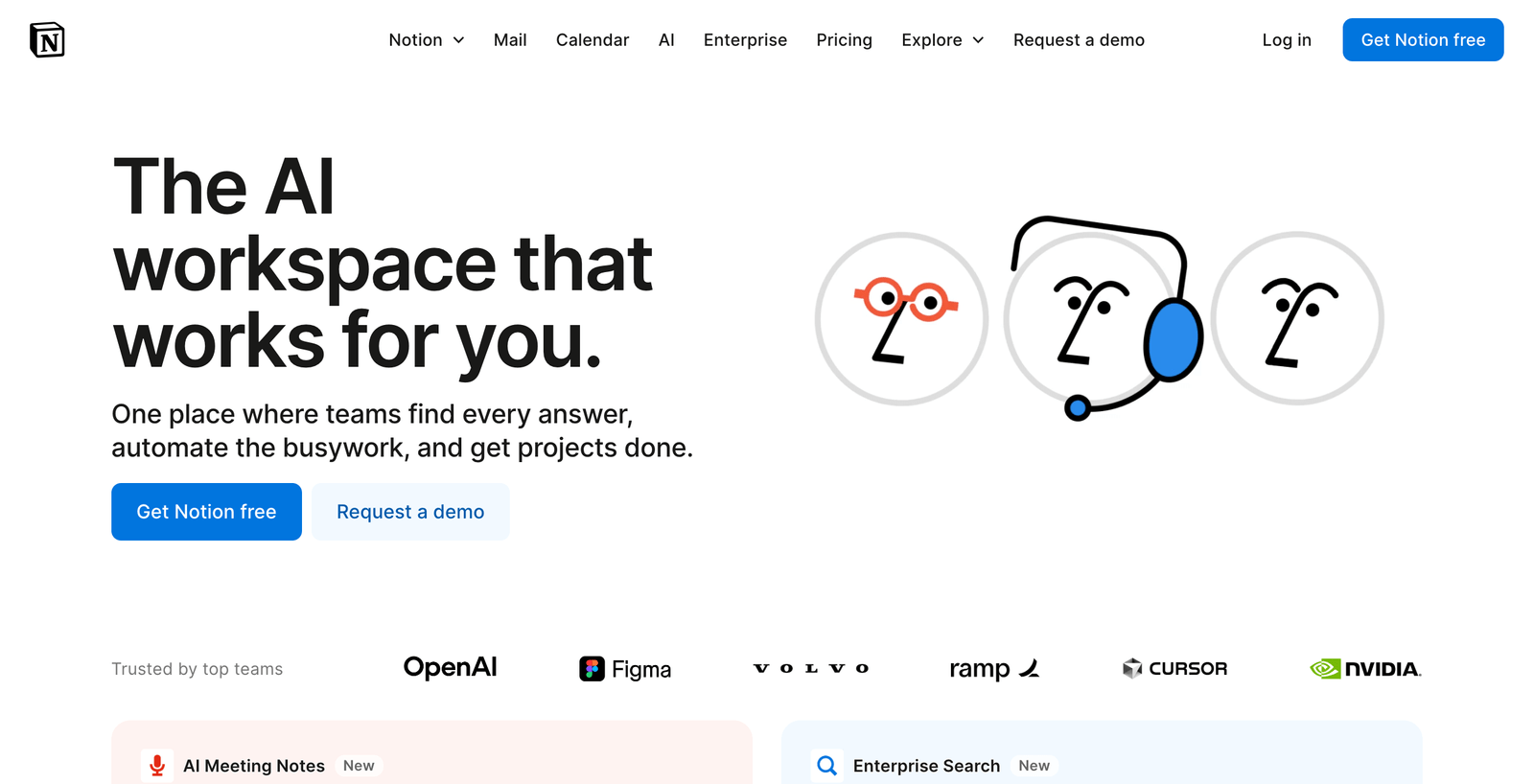
Notion, our pick for the best legal collaboration tool for case organization
Notion pros:
- Highly customizable for different practice areas
- Excellent template sharing across teams
- Combines notes, databases, and project management
Notion cons:
- Requires initial setup time
- May lack some legal-specific compliance features
Notion’s flexibility makes it excellent for organizing complex legal matters. You can create custom databases for cases, clients, and deadlines, then build workflows that match your specific practice requirements. The platform works especially well for litigation teams managing multiple cases with varying requirements.
The collaborative features allow teams to build shared knowledge bases, case chronologies, and research repositories. Team members can simultaneously edit documents, add comments, and track changes, while the version history ensures you can always revert to previous versions of important case summaries or legal strategies.
What makes Notion powerful for legal work is its ability to create relationships between different pieces of information. You can link clients to their cases, cases to relevant documents, and documents to specific deadlines, creating a comprehensive view of your practice that’s easy to navigate and update.
The template system allows successful case organization structures to be shared across the team or firm. Senior attorneys can create templates for common case types, ensuring consistent organization and reducing setup time for new matters.
Notion price: Free plan available for personal use, with team plans starting at $10/month per user.
Best legal collaboration tool for project management
Asana

Asana, our pick for the best legal collaboration tool for project management
Asana pros:
- Excellent timeline and dependency management
- Strong reporting and progress tracking
- Integrates well with legal software
Asana cons:
- Generic tool that requires customization for legal use
- May need additional security configuration
Asana brings project management discipline to legal work, helping teams manage complex cases with multiple deadlines, dependencies, and stakeholders. The platform excels at breaking down large legal projects into manageable tasks with clear ownership and deadlines.
The timeline view is particularly useful for litigation, where discovery deadlines, motion filings, and court dates must be carefully coordinated. You can see how delays in one area might affect other case milestones, allowing for proactive scheduling adjustments.
Task dependencies help manage complex legal workflows. For example, you can set up a sequence where document review must be completed before drafting motions, which must be finished before filing deadlines. The platform automatically adjusts schedules when dependencies change.
The reporting features provide visibility into team workload and case progress, helping partners allocate resources effectively and identify potential bottlenecks before they impact case outcomes.
Asana price: Free plan available for small teams, with paid plans starting at $13.49/month per user for advanced project management features.
Best legal collaboration tool for client meetings
Zoom

Zoom, our pick for the best legal collaboration tool for client meetings
Zoom pros:
- Reliable video quality and connection stability
- Comprehensive recording and transcription features
- Strong security controls for confidential meetings
Zoom cons:
- Requires proper security configuration
- Recording storage can become expensive
Zoom has become essential for legal practice, enabling secure client meetings, depositions, and court appearances. The platform’s reliability and feature set make it suitable for high-stakes legal communications where technical failures aren’t acceptable.
The security features are crucial for legal work. You can require passwords for meetings, use waiting rooms to control access, and enable end-to-end encryption for the most sensitive discussions. The platform also supports single sign-on integration with firm security systems.
Recording capabilities with automatic transcription create searchable archives of client meetings and depositions. The transcripts can be exported and integrated with case files, providing accurate records of important discussions (with proper client consent, of course).
The breakout room feature is useful for settlement conferences or multi-party negotiations, allowing private discussions between different groups while maintaining overall meeting control.
Zoom price: Basic free plan available for small meetings, with professional plans starting at $14.99/month per license for advanced features and longer meeting durations.
Best legal collaboration tool for electronic signatures
DocuSign
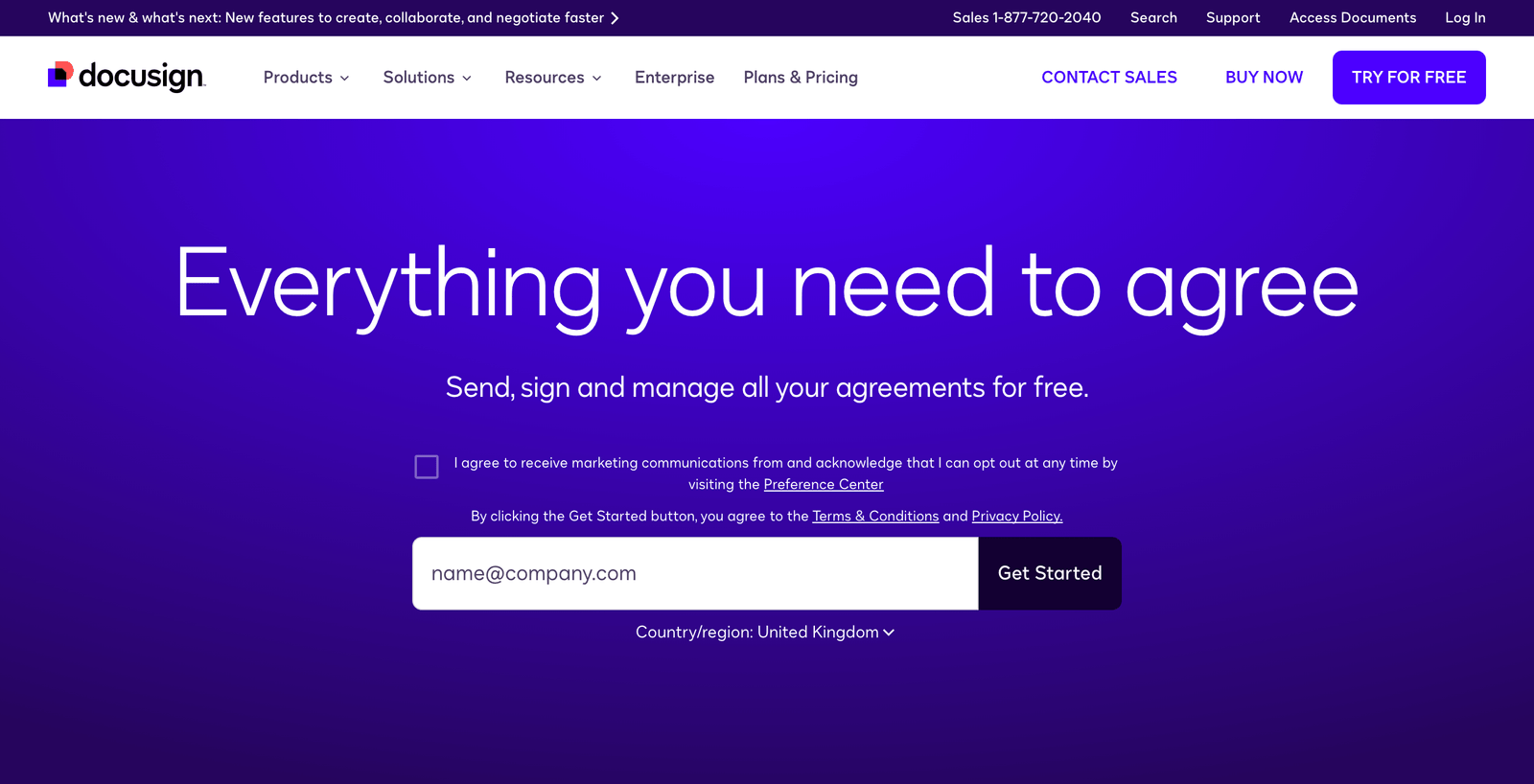
DocuSign, our pick for the best legal collaboration tool for electronic signatures
DocuSign pros:
- Industry-leading legal compliance and audit trails
- Extensive integration with legal software
- User-friendly for clients and attorneys
DocuSign cons:
- Can be expensive for high-volume use
- Some advanced features require training
DocuSign has become the standard for electronic signatures in legal practice, offering compliance with legal requirements while streamlining document execution. The platform handles everything from simple retainer agreements to complex transaction documents with multiple signatories.
The collaboration features allow multiple parties to review, comment, and sign documents in a controlled sequence. You can set up signing orders, require specific authentication methods, and include conditional logic for complex approval workflows.
The audit trail capabilities exceed most legal requirements, providing detailed records of who accessed documents, when they were signed, and from what location. These records are admissible in court and meet the highest standards for document authenticity.
Integration with legal practice management systems like Clio and document management platforms like NetDocuments means signed documents automatically file in the correct case folders with proper metadata.
DocuSign price: Plans start at $15/month per user for basic electronic signature features, with higher tiers for advanced authentication and compliance features.
Tips for picking the best legal collaboration tool
Here’s my shortlist of tips for finding the right tool for your practice:
Start with your biggest collaboration pain point. Are you struggling with document versions, missing deadlines, or client communication? Focus on solving your most pressing issue first.
Consider your compliance requirements. Different practice areas have varying security and compliance needs. Make sure any tool you choose meets your specific regulatory requirements.
Test with real cases. Set up pilot projects using actual case work, not hypothetical scenarios. This reveals workflow issues you might not anticipate.
Train your entire team. The best collaboration tool is useless if half your team doesn’t know how to use it effectively. Budget time and resources for proper training.
Plan for integration. Your collaboration tools should work together, not create additional silos. Map out how different platforms will share information.
Start small and scale. Begin with core features and gradually add complexity as your team becomes comfortable with the platform.
If you implement tools that handle client data, make sure you understand legal ethics requirements around data security, client confidentiality, and professional responsibility rules in your jurisdiction.
What’s next for legal collaboration tools?
The legal industry is experiencing rapid technological change, with AI integration becoming increasingly sophisticated. We’re seeing the emergence of tools that can automatically organize case information, suggest relevant precedents, and even draft routine documents.
The future likely holds even deeper integration between collaboration platforms and legal-specific AI capabilities. Instead of switching between research tools, document management, and communication platforms, we’ll see unified workspaces that understand legal context and can proactively assist with case management.
However, the fundamental need for human judgment, ethical considerations, and strategic thinking in legal work means that collaboration tools will remain exactly that—tools to enhance human capabilities rather than replace legal expertise.
The profession isn’t going anywhere, but the way we work together is evolving rapidly. Embrace these collaboration tools now, because the practices that adapt quickly will have significant advantages in efficiency, client service, and competitive positioning.

